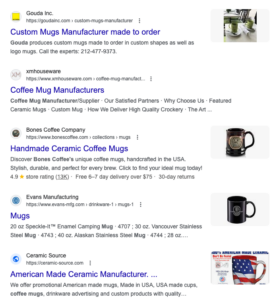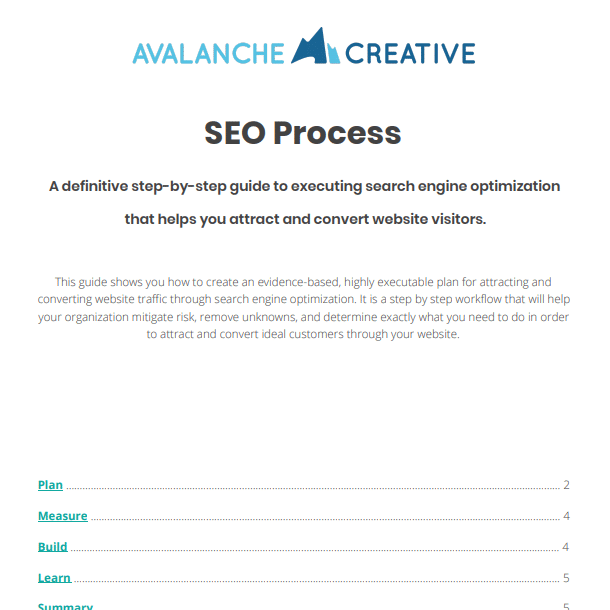An Expert’s Guide to Content Marketing for Manufacturers
Category: Content Strategy, Manufacturing | Tags:
In an age where your customers are using Google to find out about your services and products rather than having your sales staff do the legwork of pitching them, content is essential. Discover the benefits of content marketing for manufacturers and how it can help drive your overall marketing strategy.
Why Do Manufacturers Need Content Marketing?
The reasoning is simple: No matter what you produce as a manufacturer, your company needs content to help your customers understand your products and the services you provide.
People, including business decision-makers, trust search engines to help them find manufacturers like you when they need products. That’s also why it’s essential to understand how SEO for industrial companies works.
How Content Marketing for Manufacturing Companies Works
Suppose you have a potential customer who knows that they need a better way to promote their brand, and they’d like to go a step beyond printed mugs. However, they aren’t sure where to start, so they pull out their phone and use Google to do a little research.
Here’s what the results might look like if they search for the phrase, “coffee mug manufacturer,” in Google:

These are among the first results they’ll find on page one when they start looking for people who can make quality coffee mugs. Many of the results on that page use the phrase “coffee mug manufacturer” directly in the content.
Think about who’s looking for these products. They know they’d like to go a step above for their branding purposes, so they’re looking for a manufacturer that can make a good mug. Google understands why they’re looking for these services, so it offers them relevant results to help them solve that problem.
How to Create an Industrial Content Marketing Strategy
Every piece of content you or your manufacturing SEO agency creates should aim to help your customers understand more about you. The key is compelling them to want to work with you and garnering positive brand recognition in the process.
With that, empathy and evidence are the two key principles to follow at every stage when developing your content strategy. They both drive these four components.
SEO
SEO is at the backbone of your content strategy. It allows you to find the best keywords that speak to your target audience. Even more, it gives you a data-based approach with evidence to back up everything you write.
Research
Research should be at the heart of your content marketing strategy. This includes both researching keyword data and taking the time to understand who your target audience is and how they search for information about your products.
Writing
No, using generative AI won’t cut it here. While programs like ChatGPT know how to answer your most common questions at surface level, your customers can tell when something was written by a robot—and they’ll immediately know you don’t care enough to write your own content without looking at it first.
Write content with meaningful insights and answers to your manufacturing customers’ questions. This is the best way to build authority with your audiences and make them more likely to work with you.
Reusing
The best types of content you create can be reused. Not only can you circulate them on your website, but you can also incorporate them into paid advertising campaigns, promote them on social media, and more.
Parts of a Good Manufacturing Content Marketing Strategy
Selecting Target Audiences
Chances are, you have more than one audience you serve. They also probably all have different sets of needs. Speaking to your existing customers and the audiences you want to reach out to more can make a huge difference in targeting them in meaningful ways.
Creating Helpful Content
It’s essential to provide direct, clear answers to your website visitors’ questions through your content if you want to stand out from competing manufacturers. Doing so allows you to build credibility—without your future customers having to read the fine print to see what it’s really like to work with you.
In turn, they’ll be more likely to choose you for their project when they’re ready to move forward with production.
Offering Content on Different Platforms
A good content marketing strategy doesn’t limit itself to just your website. While content creation and maintenance for your website are essential, you should also promote content across multiple platforms to expand your reach. This includes sharing your content through social media, YouTube, guest posts on other platforms, email marketing, and more.
However, this doesn’t mean you have to add content to every single platform in existence. A good industrial SEO marketing agency can help you identify where your target audience spends time online and use that information to concentrate your outreach efforts on those platforms.
Fostering Conversions
A well-defined content marketing strategy can help you convert more leads on your website. However, your content strategy will help you determine what conversions look like for each piece.
Common conversion goals include:
- Subscribing to your company’s marketing newsletter
- Downloading a piece of content
- Requesting an estimate
- Submitting their information on your forms
- Clicking to call
- Reading the content itself
No matter what your call-to-action is on a given piece, your content should drive your target audience to do what you need them to do if they want to engage with your services using clear messaging.
SEO for Manufacturing Companies
Content marketing and SEO are intrinsically linked. You simply cannot do one without the other and expect the best possible results. SEO campaigns don’t get very far without quality content at their core, and your content won’t attract any attention without SEO to back it up.
A good, competent digital marketing agency for manufacturers will use a foundation of research to find good manufacturing keywords, to help your content go further. They’ll also use website audits, optimization recommendations, and on-site and off-page SEO efforts.
How to Use SEO to Spread Your Content
A robust SEO strategy will help you distribute your content far and wide by using targeted keywords that your future clients use. This includes creating pages with robust keywords and other on-page SEO features, off-site SEO, and localized content that helps you find leads in your service area.
This will allow you to reach more people who are looking for your services right when we need them.
On-Page SEO
On-page SEO refers to the written and visual content of your website. Some common examples of improving on-page SEO include adding relevant keywords to the written copy on your pages, page titles, section headings, meta descriptions, and alt text on your pages. These are the signals that tell Google about what’s on your site.
On-page SEO and content writing go hand in hand. Your website pages need well-written content to convey the manufacturing solutions you offer to potential customers. Incorporating SEO-driven keywords into your content is essential, since it helps Google understand what you offer and how to bring it to your target audience.
Off-Site SEO
Off-site SEO refers to the tactics you use to optimize your brand presence on platforms you don’t own. While off-site SEO isn’t as easy to control as the resources on your company’s website, it’s valuable because it helps you build credibility with search engines and users. Common tools and tactics for improving off-site SEO include:
- Link building: Link building is the process of developing relationships with other legitimate websites so they link back to your site and improve its credibility with search engines. The process takes time, but makes a massive difference in how your pages rank on search engine results pages (SERPs), where your customers will see you among the top results.
- Using social media: This includes posting regularly on LinkedIn and other accounts and including links to your website in your business’s social media profiles. Encouraging your customers to review your company’s Google My Business listing can also support your local SEO tactics.
- Brand monitoring: Whether you use dedicated tools or hire an agency to help you with the work, brand monitoring helps you track what people are saying about your brand and where there are links to your site online—both good and bad.
Avalanche’s SEO for Manufacturers
Details/information why it’s better to work with a dedicated agency that can focus solely upon content marketing.
Include a CTA at the bottom of this section.
Creating an effective content marketing strategy for manufacturers requires time, resources, and effort. While your marketing team might not have the bandwidth to do it on their own, working with a manufacturing SEO agency specializing in content can make it easier.
At Avalanche Creative, we specialize in creating evidence-based, data-driven SEO and content services for manufacturers that help improve website lead generation. Our empathy-based approach to SEO and content marketing allows you to attract higher-quality leads to your website to get more of the business you want.
Connect with us today to learn more.
Evidence-Based Manufacturing Content Marketing Strategies
It’s one thing to create content that your managing partners or CEO want you to make because they think they’re valuable for branding—but it’s another thing to expect that content to get any long-term traction.
Instead, the majority of your content strategy should be evidence-based and utilize data as its driving force. While marketing is not an exact science and results are never guaranteed, this gives you a better chance at helping your content rank and get in front of the people who are looking for your manufacturing services. This also allows you to adjust as needed once your content is established on your website.
Other Manufacturing Marketing Resources
Since your potential clients are most likely to search for your manufacturing services when they’re trying to solve a problem they have, it’s vital to establish brand awareness early in their journey. That way, they’ll be more likely to seek you out when ready to work with you. Outside of SEO and content writing, that can include:
- Paid search, also known as search engine marketing (SEM)
- Email marketing
- Network marketing
- Social media advertising
Start Generating More Leads
Ready to help your manufacturing business grow for the long term? Connect with us today and we’ll help you start generating leads in meaningful ways.
Frequently Asked Questions (FAQ)
Is Top-Funnel Content Useful?
Yes, it absolutely is! Top-funnel content helps you provide answers to the surface-level questions your potential customers may have. This allows you to establish expertise early on while they’re still researching the best options for their manufacturing needs, without scaring them away by talking too aggressively about signing on with you.
How Long Does Content Marketing for Manufacturing Companies Take to Work?
Typically, it takes several months to start seeing tangible SEO results once you start rolling out your content marketing strategy. Our team can sometimes identify low-hanging fruit to help you start ranking for specific keywords quickly, but it typically takes Google’s algorithm time to recognize your efforts.
However, once you have a page ranking highly in Google’s search results, it’s much easier to keep your brand in that position for a long time.
What Should Manufacturing SEO Services Include?
In short, your manufacturing SEO agency should offer the following services as part of their partnership with you:
- SEO strategy planning
- Website optimization and design
- Content writing
Share this article:
The Avalanche Email: Fun. Simple. Educational. No Selling.
Learn Result-focused SEO & Content
Join over 2,272+ others who get one email every Wednesday with simple instructions on how to get more website traffic and leads through SEO and content marketing. (Learn more about the email)
Keep Learning
Creating the Perfect SEO Content Template in Google Docs
Learn how to create an SEO Content Templates in Google Docs to help drive new traffic to your website from the search engines. SEO Content Templates provide specific recommendations and directives for creating new content on your website with the purpose of improving your SEO.
How To Show Up in Gemini (And Win More Local Jobs)
Show up in Gemini when homeowners search for landscaping services. Build the right signals on Google and your website to win more qualified local jobs.
How to Run Google Ads for Landscapers: A Complete Guide
Learn how to set up Google Ads for landscapers, attract qualified leads, and win more local jobs with this step-by-step guide.
🏔️ Watering > Planting New Seeds
Your next marketing win may already be on your site. Learn how to optimize existing pages for better rankings, traffic, and results.
The Recipe vs. The Meal
Your customers buy the experience, not the product. Discover a simple way to shift your message from ingredients to the full meal.
What’s the Best CMS for Landscaping Businesses?
Compare the best website platforms for landscapers. Learn the pros and cons of Wix, Squarespace, and WordPress, and why WordPress is best for long-term SEO.





